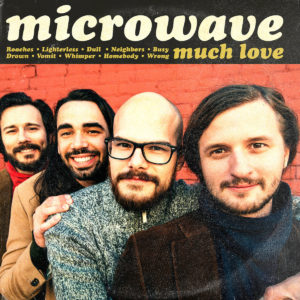Staff List: Colin’s Top Albums
Posted: by The Alt Editing Staff
Over the next few weeks, The Alternative will be publishing numerous EOTY staff lists leading up to our site-wide ‘Top 50 Albums of the Year’ article. Why so many lists? Well, we believe in giving as many bands/artists exposure as possible, and with so many great releases in 2016, more lists will cover more ground. Our goal is to help you find something new. Thank you for reading.
Here, Colin Macfarlane writes about his top albums of the year.
9. Bad Suns–Disappear Here

Pop-rock is a dying genre, but Bad Suns are the best case to keep a dying genre on life support. Their debut record Language and Perspective was energetic and showed flashes of brilliance. Smooth guitars backed by thumping bass lines resulted in eleven dance-ready songs. Disappear Here is a fuller, more fleshed out version of their debut. It’s a lengthier, more diversified portfolio of songs.
Ringing pop tracks are followed by guitar-driven rock songs, and at points the two styles are mashed together in one song—at others they neatly shift from one to the other. “Disappear Here,” the album’s lead single, is the band’s best song to date. It’s intentionally hollow, which allows the bass to set the song’s beat and carry it along until the propulsive chorus hits. Overall, Disappear Here is an entertaining listen with an ability to get its melodies stuck in your head.
8. Joyce Manor–Cody

As someone who wasn’t shy about not enjoying Joyce Manor’s first two releases, I was pleasantly surprised by the band’s third full-length album, Never Hungover Again. It was a friendlier, less abrupt take on their previously abrasive songs. On Cody, the band continues to move away from their once polarizing sound, slowly forming into a warmer, wittier, and catchier version of Weezer during their peak.
Cody’s lyrics are clever and its songs are diverse – spiking and diving in their aggression, all while each maintaining a lively hook. On this album, Joyce Manor proved that Never Hungover Again wasn’t a fluke, but in fact a tipping point for a series of superb albums.
7. Crying–Beyond the Fleeting Gales

It’s not a backhanded compliment to Crying’s previous releases, which showed promise, but in every aspect, the band grew up while writing Beyond the Fleeting Gales. It’s apparent that Crying have discovered that they can write athematic songs without the silliness featured on 2014’s Get Olde / Second Wind.
Gales successfully teeters the fine line between structured chaos and reckless abandon. As a result, don’t expect to be able to hear yourself think while listening to the gigantic choruses of songs like “Premonitory Dream,” “A Sudden Gust,” and “Revive.” It’s highly probable that Crying have used more instruments on this record than I can count on two hands, but they’re incorporated thoughtfully and productively, which is why the record is far above noteworthy.
6. All Get Out–Nobody Likes a Quitter

The lead single from the band’s sophomore record, five years in the making, leads off with, “I’ll give it one more try and I’ll be happy if you die.” On the whole, perhaps Nobody Likes A Quitter doesn’t highlight the rambunctious band fans remembered five years ago on their debut, The Season. But Nathan Hussey’s stinging and occasionally sarcastic lyrics help negate the separation between the band’s prior sound and their slightly more poppy, linear sound on NLAQ.
“Whatever” is the obvious instance where All Get Out illustrates their artistic shift by emphasizing each song’s seamless verses and strung-out bridge, instead of just its chorus. Hussey has successfully steered another album of his involvement towards exceptional, and it’s not a surprise.
5. Pinegrove–Cardinal

New Jersey’s produced dozens of bands that have broken out of the alternative music scene to become adored coast to coast. With that being said, it’s been quite some since the Garden State has given us a national treasure. But is there any form of praise that hasn’t bestowed Cardinal yet? It’s a folk-rock record with an ability to capture listeners from a variety of genres, whether it be blues, emo, and/or bluegrass.
If Evan Stephens Hall can pen a few more lines akin to those in “Aphasia” (“One day I won’t need your love / One day I won’t define myself by the one I’m thinking of”) it’ll only be a matter of time before Pinegrove has cemented itself as a household name for fans of any genre of music.
4. The Hotelier—Goodness

The Hotelier could have replicated the tension that made Home, Like No Place Is There special. The Hotelier, alas, is special because they do not force their emotions. The band writes songs regarding their current mental state, not one based on nostalgia or history. Goodness represents a steadier and brighter period in vocalist Christian Holden’s life while still alluding to his prior hardships. This stability lets The Hotelier trade in anguish for experimentation.
Consequently, the album art and some of its musical decisions are peculiar, but ultimately, the album is confident in itself. Goodness is a considerable achievement for the band because it’s a grandiose concept album about duality – youth and old age, happiness and sadness – but they didn’t abandon their strained sound in order to convey the record’s theme. It all sits comfortably together.
3. Car Seat Headrest—Teens of Denial

The mastermind of Car Seat Headrest, Will Toldeo, wears his influences on his sleeve throughout Teens of Denial, paying homage to bands such as The Clash, The Ramones, and Cake. It’s somewhat surprising that the record has gained critical acclaim, as most of the album’s songs are lengthy rock ballads that painstakingly build to one brief, thrilling moment. Teens of Denial excels, however, because Toledo has as much to say in the interim as he does when the songs erupt. In “Drunk Drivers / Killer Whales,” he solemnly claims, “We are not a proud race / It’s not a race at all / We’re just trying, I’m only trying to get home / Drunk drivers.”
The record’s most impactful scores are memorable because of the realizations that occur in quieter portions of the songs. Toledo understands that he needs to give his listener context for his frustrations, and the way he goes about doing so is why Teens of Denial will be an album with plenty of replay value for years to come.
2. Jeff Rosenstock—WORRY.

WORRY. isn’t the neatest or smoothest record of the year. It abruptly shifts; manic choruses and gang vocals are followed by near silence. Introductory keystrokes are drowned out by scratchy vocals and impatient guitars. It’s only this way because Rosenstock has so much to say in such little time. But attempting to crunch every musical idea and political burn into one record is ill-advised at worst on WORRY. because the message conveyed within the album is important in a way words cannot give full credence.
WORRY. is a masterful explanation of this country’s division and anxiety, containing universal appeal because it unapologetically points out the idiocy and hypocrisy within our political and social culture. It’s the main reason that this record has obtained national attention and was USA Today’s ‘#1 Album of the Year’ – Rosenstock’s words go beyond any meaningless genre boundary or ideological stereotype. In a way, Rosenstock’s words become bigger than himself.
Take for example “Festival Song,” where he sings that, “It feels completely ridiculous that I’m a willing participant / Gazing at the purple and pinks in the shadow of a bank-sponsored skyline / Unite against the establishment.” It’s not likely that Rosenstock wrote this record attempting to define one of the most tumultuous years in modern American history, but I’m sure that as it took form, he knew something special was brewing.
1.Microwave—Much Love

Much Love is the best true to form rock record of the year. It’s loud and climatic, however, Microwave shines when they trade in their aggression for serenity. “Roaches,” “Dull,” and “Wrong” slowly progress through harmless and interesting riffs below Nathan Hardy’s soft yet jarring vocals. Hardy’s dramatic delivery is chilling and his lyrics witty, enough so to become the outstanding focal point throughout Much Love.
“Vomit,” the least accessible song on the album, is the premier example of Microwave’s balancing act. Rhythmic guitar melodies that sit right between Hardy’s calm voice and Tito Pittard’s delicate drum pattern unexpectedly detonate with power and hostility reminiscent of Brand New’s “You Won’t Know.”
A well-executed, straightforward rock album always warrants my number one spot. Today, an abundant amount of resources and production methods are available to touring bands. For a band to consciously make an effort to avoid those resources and solely rely on their musicianship and songwriting is a major risk. There have been many talented bands that have tried to do the “classic” rock album and have fallen short. Microwave have not, which is one of many reasons that they’re the most promising band alternative music has to offer.
Honorable Mentions: Jimmy Eat World, Half Hearted Hero, Kevin Devine, Hot Hot Heat, Thrice, Tancred, Taking Back Sunday, and PUP.
Best Non- LPs: Amarillo Tapes – Volumes I & II, The Starting Line EP
—
Colin Macfarlane










